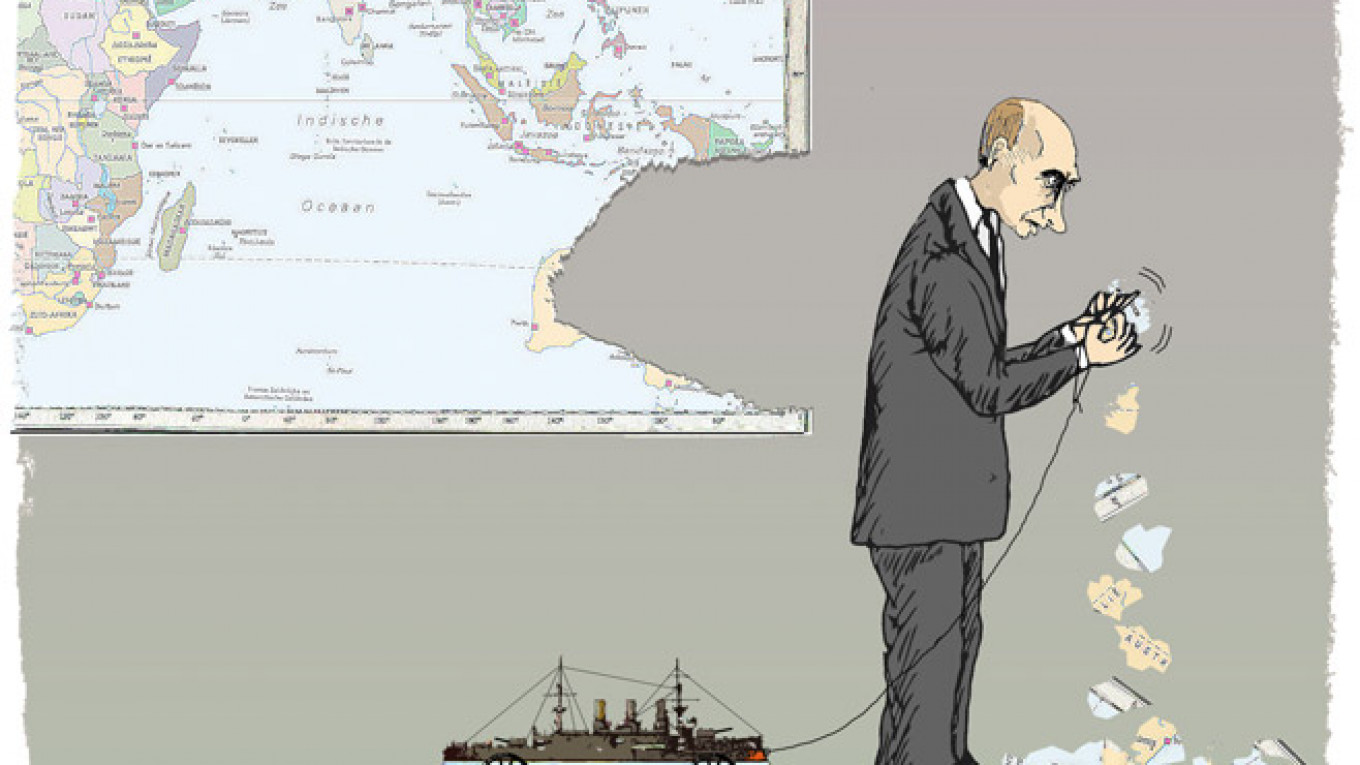Some define "militarism" as when political leaders prefer using military solutions for every problem they face, and two recent events have brought this idea to mind. The first was the decision to station near the shores of Australia practically every vessel of Russia's Pacific Fleet that could make the trip during President Vladimir Putin's attendance at the Group of 20 summit in Brisbane. That deployment included the missile cruiser flagship Varyag, the large anti-submarine ship Marshal Shaposhnikov, the oil tanker Boris Butoma and the salvage tug Foty Krylov.
The second was Defense Minister Sergei Shoigu's words concerning Russia's strategic aviation that he delivered at a recent Defense Ministry meeting. "In the current situation we must use long-range aircraft to provide a military presence in the western Atlantic Ocean and eastern Pacific Ocean, in the waters of the Caribbean and Gulf of Mexico, and to conduct aerial reconnaissance activities of foreign armed forces and maritime communications," Shoigu said.
Moscow undoubtedly ordered this strange military "response" to the deep and decidedly non-military problem of Russia's growing international isolation. With more than two dozen of Australia's citizens killed on Malaysia Airlines Flight MH17, the Kremlin expected that Putin would face harsh criticism over the Ukraine conflict from other leaders at the summit. And how did Moscow respond? By deploying a naval squadron to the Australian coast and threatening to send strategic aircraft to the "soft underbelly" of the U.S.
None of these escapades makes much sense from a military point of view. Deploying four very old warships to the Australian coast does not exactly impress anyone, and if the U.S. had sent a couple of carrier battle groups to those same waters, the Russian ships would have looked like so many tugboats by comparison.
The same is true of Russian strategic bombers patrolling the Gulf of Mexico. If the Defense Ministry carries out Shoigu's instructions, Russian bombers will begin making regular patrols of the Caribbean Sea and the Gulf of Mexico. Russian strategic aircraft already fly "around the corner," skirting Scandinavia and darting up to the Faroe Islands where they simulate a cruise missile attack against U.S. territory.
Now Moscow threatens to the do the same in the Caribbean. The problem is that, in contrast with the almost empty skies in the far north, in the south the Russian bombers will have to operate amid extremely heavy air traffic. That greatly increases the likelihood of a wide range of incidents, any one of which could have disastrous consequences.
What's more, it makes little military sense to fly strategic bombers without cover from fighter aircraft: In the event of hostilities, it is a simple matter to shoot them down. Russia would have to create permanent military bases in South America to provide such fighter cover. But even if Russia did manage to give the U.S. the sense of an imminent threat, Washington is more than able to respond. It could launch regular air patrols along the Russian border — not a difficult task considering that the U.S. has exactly twice as many strategic bombers as Russia.
But it seems that Russia's naval deployment to Australian waters and the threat of sending aircraft with nuclear bombs to the Caribbean is more a symbolic move than a military one. Moscow feels it is necessary to remind every last person that Russia is a great military power and that it can "scare the sh-- out of the Americans," as former Soviet leader Nikita Khrushchev once said. Well-known pro-Kremlin journalist and Rosneft vice president Mikhail Leontyev said it even more clearly. "That bastard [Australian Prime Minister Tony] Abbot is planning to ask [Putin] some tough questions, eh? How would he like a tough response — a fist in his ugly mug?"
It seems that the minute U.S.-Russian relations sour, it triggers a reflex making Moscow leaders want to send bombers off to Florida or some such place. Offended that Washington sent a ship laden with humanitarian aid to Georgia immediately after the Russia-Georgia War in 2008, Moscow sent two strategic bombers to Venezuela. Both now and in 2008, Washington did not tremble in terror, but coolly responded by saying that such statements do not demonstrate a responsible approach to international security.
According to reports from Brisbane, there was no shortage of tough questions directed at Putin. It seems the only one who did not "have his turn at" the Russian president was the koala bear Putin posed with for photographs. It was no coincidence that he left the summit even before the end of the planned activities. The presence of Russian warships off the Australian coast did nothing to improve the credibility of the Russian president. Even the 16 Vulkan anti-ship missile systems on board the Varyag cruiser did not help.
Alexander Golts is deputy editor of the online newspaper Yezhednevny Zhurnal.
A Message from The Moscow Times:
Dear readers,
We are facing unprecedented challenges. Russia's Prosecutor General's Office has designated The Moscow Times as an "undesirable" organization, criminalizing our work and putting our staff at risk of prosecution. This follows our earlier unjust labeling as a "foreign agent."
These actions are direct attempts to silence independent journalism in Russia. The authorities claim our work "discredits the decisions of the Russian leadership." We see things differently: we strive to provide accurate, unbiased reporting on Russia.
We, the journalists of The Moscow Times, refuse to be silenced. But to continue our work, we need your help.
Your support, no matter how small, makes a world of difference. If you can, please support us monthly starting from just $2. It's quick to set up, and every contribution makes a significant impact.
By supporting The Moscow Times, you're defending open, independent journalism in the face of repression. Thank you for standing with us.
Remind me later.







